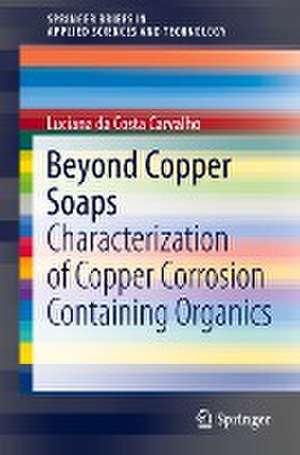Beyond Copper Soaps: Characterization of Copper Corrosion Containing Organics: SpringerBriefs in Applied Sciences and Technology
Autor Luciana da Costa Carvalhoen Limba Engleză Paperback – 17 apr 2022
Din seria SpringerBriefs in Applied Sciences and Technology
- 20%
 Preț: 326.28 lei
Preț: 326.28 lei - 17%
 Preț: 360.33 lei
Preț: 360.33 lei -
 Preț: 479.67 lei
Preț: 479.67 lei -
 Preț: 378.12 lei
Preț: 378.12 lei -
 Preț: 409.43 lei
Preț: 409.43 lei -
 Preț: 344.90 lei
Preț: 344.90 lei - 20%
 Preț: 225.31 lei
Preț: 225.31 lei -
 Preț: 376.59 lei
Preț: 376.59 lei -
 Preț: 444.52 lei
Preț: 444.52 lei -
 Preț: 378.12 lei
Preț: 378.12 lei -
 Preț: 377.18 lei
Preț: 377.18 lei -
 Preț: 355.48 lei
Preț: 355.48 lei -
 Preț: 344.90 lei
Preț: 344.90 lei -
 Preț: 380.07 lei
Preț: 380.07 lei -
 Preț: 380.07 lei
Preț: 380.07 lei -
 Preț: 356.42 lei
Preț: 356.42 lei -
 Preț: 382.95 lei
Preț: 382.95 lei -
 Preț: 376.59 lei
Preț: 376.59 lei -
 Preț: 380.29 lei
Preț: 380.29 lei - 20%
 Preț: 288.73 lei
Preț: 288.73 lei - 20%
 Preț: 322.17 lei
Preț: 322.17 lei - 20%
 Preț: 293.83 lei
Preț: 293.83 lei -
 Preț: 273.63 lei
Preț: 273.63 lei - 15%
 Preț: 462.51 lei
Preț: 462.51 lei -
 Preț: 410.85 lei
Preț: 410.85 lei -
 Preț: 382.95 lei
Preț: 382.95 lei -
 Preț: 355.92 lei
Preț: 355.92 lei -
 Preț: 378.12 lei
Preț: 378.12 lei -
 Preț: 264.79 lei
Preț: 264.79 lei -
 Preț: 312.68 lei
Preț: 312.68 lei -
 Preț: 380.07 lei
Preț: 380.07 lei -
 Preț: 356.45 lei
Preț: 356.45 lei -
 Preț: 382.32 lei
Preț: 382.32 lei - 20%
 Preț: 324.64 lei
Preț: 324.64 lei -
 Preț: 412.30 lei
Preț: 412.30 lei -
 Preț: 378.12 lei
Preț: 378.12 lei -
 Preț: 355.65 lei
Preț: 355.65 lei -
 Preț: 415.18 lei
Preț: 415.18 lei -
 Preț: 195.87 lei
Preț: 195.87 lei -
 Preț: 379.09 lei
Preț: 379.09 lei - 20%
 Preț: 386.11 lei
Preț: 386.11 lei -
 Preț: 381.98 lei
Preț: 381.98 lei -
 Preț: 377.57 lei
Preț: 377.57 lei - 20%
 Preț: 301.85 lei
Preț: 301.85 lei -
 Preț: 380.07 lei
Preț: 380.07 lei -
 Preț: 261.91 lei
Preț: 261.91 lei -
 Preț: 376.22 lei
Preț: 376.22 lei -
 Preț: 377.95 lei
Preț: 377.95 lei -
 Preț: 379.68 lei
Preț: 379.68 lei -
 Preț: 374.30 lei
Preț: 374.30 lei
Preț: 349.10 lei
Nou
Puncte Express: 524
Preț estimativ în valută:
66.82€ • 69.49$ • 55.99£
66.82€ • 69.49$ • 55.99£
Carte tipărită la comandă
Livrare economică 10-15 martie
Preluare comenzi: 021 569.72.76
Specificații
ISBN-13: 9783030978914
ISBN-10: 3030978915
Pagini: 57
Ilustrații: XIX, 57 p. 22 illus., 6 illus. in color.
Dimensiuni: 155 x 235 mm
Greutate: 0.16 kg
Ediția:1st ed. 2022
Editura: Springer International Publishing
Colecția Springer
Seria SpringerBriefs in Applied Sciences and Technology
Locul publicării:Cham, Switzerland
ISBN-10: 3030978915
Pagini: 57
Ilustrații: XIX, 57 p. 22 illus., 6 illus. in color.
Dimensiuni: 155 x 235 mm
Greutate: 0.16 kg
Ediția:1st ed. 2022
Editura: Springer International Publishing
Colecția Springer
Seria SpringerBriefs in Applied Sciences and Technology
Locul publicării:Cham, Switzerland
Cuprins
1. Metal Organic Complexes,- 2. Corrosion Experiments.- 3. Characterization of copper-organic complexes and copper-milk corrosion.- 4. evaluation of analytical techniques.- 5. conclusion.- 6. Methods.
Notă biografică
Dr Luciana da Costa Carvalho obtained her Ph.D. in Archaeological Sciences from the University of Oxford where she investigated copper–organic complexes and organic residues trapped in archaeological copper corrosion. She used a multi-analytical protocol for characterization of samples that included FT-IR, Raman, XRD, XPS, and mass spectrometry techniques including bottom-up proteomics.
Dr Luciana da Costa Carvalho has been trained as a museum and archaeological conservator at the University College London (UCL) and holds qualifications in environment and economic development, and Egyptology and chemistry. Recently, she was awarded the Boroll Prize at the 41st British Mass Spectrometry Society Annual Meeting held at Sheffield University for best flash oral presentation of the identification of honey in a 530-510BC residue found in a copper jar.
Dr Luciana da Costa Carvalho has been trained as a museum and archaeological conservator at the University College London (UCL) and holds qualifications in environment and economic development, and Egyptology and chemistry. Recently, she was awarded the Boroll Prize at the 41st British Mass Spectrometry Society Annual Meeting held at Sheffield University for best flash oral presentation of the identification of honey in a 530-510BC residue found in a copper jar.
Caracteristici
Provides a significant extension of the study of organic residues in archaeology Reports a simple electrochemical protocol for the synthesis of copper–organic complexes Represents an extension of the routine methodology for studying metal corrosion products
